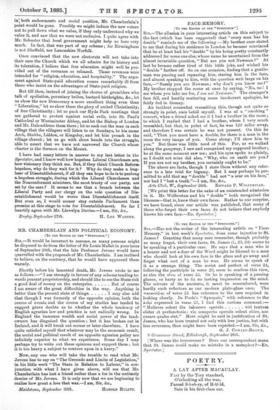MR. CHAMBERLAIN AND POLITICAL ECONOMY.
pro THE EDITOR OF THE 'SPECTATOR."] STE,-It would be incorrect to assume, as many persons might be disposed to do from the letter of Sir Louis Mallet in your issue of September 26th, that the late Professor Jevons would have quarrelled with the proposals of Mr. Chamberlain. I am inclined to believe, on the contrary, that he would have approved them warmly.
Shortly before his lamented death, Mr. Jevons wrote to me as follows :—" I am strongly in favour of any scheme tending to- wards peasant proprietorship, and should like to see the State risk a good deal of money on the enterprise But of course I am aware of the great difficulties in the way. Anything is better than the present state of things I may also add that though I was formerly of the opposite opinion, both the course of events and the course of my studies has tended to suggest grave doubts as to whether the whole tendency of English agrarian law and practice is not radically wrong. In England the immense wealth and social power of the land- owners has disguised the question ; but it has broken out in Ireland, and it will break out sooner or later elsewhere. I have quite satisfied myself that whatever may be the economic result, the social and political result of an opposite agrarian policy are infinitely superior to what we experience. Some day I may perhaps try to write out these opinions and support them ; but it is too heavy a., subject to venture upon in a hurry."
Now, any one who will take the trouble to read what Mr. Jevons has to say on "The Grounds and Limits of Legislation," in his little work "The State in Relation to Labour," in con, junction with what I have given above, will see that Mr. Chamberlain has lost a friend rather than a foe in the untimely demise of Mr. Jevons. It is only now that we are beginning to realise how great a loss that was.—I am, Sir, &c.,














































 Previous page
Previous page